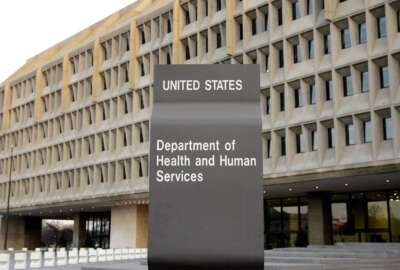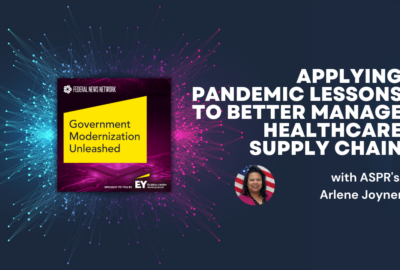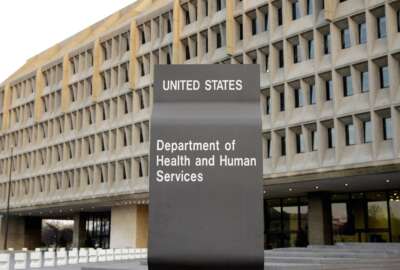This federal institution has an institution of its own
Can a federal department have an institution. Health and Human Services does. Its institution is a person: Bill Hall, who recently retired after — get this — 43...
Can a federal department have an institution? Health and Human Services does. Its institution is a person: Bill Hall, who recently retired after — get this — 43 years in public affairs. He retired as a Deputy Assistant Secretary. Federal Drive with Tom Temin spoke with Bill Hall all in-studio.
Interview Transcript:
Tom Temin And everybody in the government deals with it, but I’m not sure everyone knows the scope of what’s required and what happens in the public affairs functions. So just give us a quick overview.
Bill Hall The public affairs is a broad range of work and it really focuses on communicating the work that the government does. No matter what department or agency you’re in, the government does a tremendous amount of good work for the American people. And the only way to tell the American people about it is to communicate about it in an effective way that’s understandable. So at HHS, clearly our focus is on the health and well-being of Americans. So it’s critical. And the public affairs community, the team there to be able to help our scientists, our medical experts, to try to explain things as clearly and as simply as possible to the American public so they know what they’re getting for their their tax dollars and what can be helpful to them as far as what the government’s doing to help them.
Tom Temin And often, though, the public communications that is direct to, say the public through television or whatever is during a crisis and often the crisis in the case of public health crises, which HHS has dealt with a series of them in your tenure of 43 years. Sometimes the government isn’t exactly performing the way it necessarily should, and this is true of a lot of agencies. So there’s that tension, too, sometimes there, isn’t there?
Bill Hall Yes. I think that in any public health emergency, any kind of disease outbreak, there’s no perfect way to do it. There are lots of different parties or elements involved. I mean, there’s the scientists, there’s the policymakers. You have legislators, you have local officials. So you have lots of different groups that have their own interest and ways of doing things. So you really have to kind of walk through that minefield, if you will, to sort of communicate as effectively as you can. Keeping in mind all the policy, political and legal ramifications that come into play. So it’s a challenge. It’s not an easy, pick up the book and here’s how you do it. Each emergency is different and each one has its own challenges. And so you have to kind of draw upon your knowledge and experience and past experiences with previous outbreaks and previous emergencies to sort of help guide you in whatever the new situation is.
Tom Temin And watching, success of, say, White House press secretaries or different spokespeople of not as a journalist from my standpoint, but just watching TV when something is going on. It seems to me that a really important quality in that type of public affairs when you are communicating in some important happening, good or bad, is a relatability, a sense that the person is genuine and not just giving a party line. True?
Bill Hall Absolutely. And I think trust and credibility is key and most important when talking to the American public. And so, our scientists, a lot of them very, very smart people. Some are a lot better at communicating to the public than others. Some of them are, when it comes to talking to each other as scientists, they talk just quite fine with each other. But when they have to talk to the public, it’s a challenge. A part of what public affairs does is try to help them get to that point. And so our job is to try to identify who are the best experts and who can communicate most effectively to share the right messages to the public. And it depends on the medium as well. So if it’s a newspaper or a telephone interview, that’s very different than doing a television interview, a live interview on radio or what have you. So there’s different techniques. And we do a lot of media training for our experts as well to help get them to, play these things out in a safe environment where they can like make the mistakes and kind of learn before they go on and do it for real.
Tom Temin Well, as long as you never gave them scripts to read because that’s deadly in a lot of public affairs people do. And I can hear it.
Bill Hall We let our scientists speak. We don’t give them scripts. But if they say something a certain way and it’s like and I don’t understand it and having been in the business for 40 plus years, I’m like, let’s take a step back. Let’s try to think of a different way to say this and not tell them word for word, but say it again in a different way. How would you explain it to your mother or to your neighbor?
Tom Temin We were speaking with Bill Hall. He retired recently as deputy assistant secretary of HHS for public affairs. And dealing with the press, of course, is a big part of public affairs. How would you say it has changed? Is the press getting more doctrinaire? Is it getting more partisan? Is it having an axe to grind or a point of view that it wishes to push relative to 43 years ago?
Bill Hall I think in the world of science and medical communications, I think that there is more divisiveness, I think, among the media. And I think that’s simply a reflection of the partisan nature and divisive nature that we see ourselves right now in this country. But there is a cadre of good science reporters who are really there to get the story, to get the information, and they don’t come at it from a partisan perspective. And those are the ones who we really work with the most anyway. So there’s always going to be different viewpoints that people come to a story with. Clearly, the technology that we use today is very different than it was 40 years ago when I started. CNN had just started on the air a few months before I started working for the government. So today, anyone with a smartphone can be out there live streaming something. And that’s probably one of the biggest challenges, is reacting to all of this stuff that appears on the Internet almost instantly. And you don’t really have the time to plan your response, think through what’s happening here. And you’re being forced to react immediately. And that’s very different than it was many, many years ago.
Tom Temin And also, if something is a phenomenon on social media, it gets reported as look what’s happening on social media. But it could be that what is happening on social media is nonsense. Just being pushed by 10,000 people who want to push something that really has no connection with importance in reality?
Bill Hall Correct. The problem is that there are media who will see that happening and think that’s a story. There’s controversy. Let’s go cover that. And so then it appears on a more mainstream media outlet and people see that and they go, oh, this must have some validity to it. And it’s just a thing that just builds upon itself.
Tom Temin So, yeah, I never understood the story, Twitter says therefore… Be quiet. Go find a real story. Just personal prejudice here. And let’s talk about you for a minute. 43 years. Did you work in the private sector first or have you been always at HHS? Tell us about your own journey here.
Bill Hall So my entire career was in with HHS and the federal government. I started in 1980, right out of college. When I went to college, I always had a love and passion for science and medicine. And so while I was in college, I thought, I’ll go into medicine, go into it, perhaps be a doctor or study biology and so forth. And while I was there as a sort of a side, extracurricular activity, they had a couple radio stations at the college campus managed.
Tom Temin And this was where?
Bill Hall St. Lawrence University.
Tom Temin Upstate New York.
Bill Hall New York. And they had an AM college campus station and then they hosted housed a NPR station there as well. And so I got involved in the college station and worked my way up and was the general manager. And I just love doing it. It was a fun thing to do besides studying for exams. And as I went through my my college career, I then got hired by the National Public Radio station while I was at school to work there as well. So I got to experience all aspects of broadcasting and radio broadcasting. So writing news, going out in the field to report, hosting music programs, everything you could probably do in radio. And I just I just loved it. So I decided that, maybe that’s where I really want to go with my career, but I don’t have any academic background at this point, so let me do that. So I came to University of Maryland, went to their journalism school, worked at their college station for a little bit, their college newspaper. While I was there, I needed a few extra dollars in my pocket and on the bulletin board they had an ad for a job at a place called the National Institutes of Health. Part time writer, editor, job. Thought I’ll apply for it. I don’t know much about it. Didn’t know too much about NIH. I’d heard of it, but wasn’t too familiar with it. Long story short, they hired me. I was a student appointment, part time job and spent several years in that part time role. And then they offered me a permanent job. And I got to work with some of the world’s greatest and smartest scientists and researchers worked my way up through a variety of offices at NIH and got to really expand my ability to work with the media. I ran a program where we hosted large press conferences several times a year where the agency would announce new clinical guidance for doctors around the country based on the research that NIH was doing. And so it was a great interface with the media and with the public to communicate that science. And after about 17, 18 years at NIH, I was like, okay, this is great, but there’s more out there. There’s got to be more out there. And I was fortunate to get hired by the department in their public affairs office, the headquarters where I got to continue not only to work with NIH, but now with CDC, the Centers for Disease Control and Prevention, the Food Drug Administration, all of the other public health agencies in the department. So that just was just wonderful because I got to experience all the the entire spectrum of how HHS helped Americans every day.
Tom Temin And how many secretaries have come and gone in your tenure?
Bill Hall 13.
Tom Temin And I guess later on in the career, you had more contact with them. Any any good stories from that, that part of your life?
Bill Hall Oh, they were all great people. The eight that I worked with directly when I was at headquarters, all wonderful people. Every single one of them. Their core desire was to help the American people improve their health and well-being. Each one was different. Different approaches to management. But all great to work with. All really great to work with. A lot of great stories, but no one particular that I want to single out.
Tom Temin Well, that’s always the public affairs guy, even in retirement. And federal employment. That sounds satisfying for you. Have you sensed a change in federal employment, the conditions, the attitudes toward it in those years?
Bill Hall I think it goes throughs ebbs and flows. We see peaks and then dips in interest. I think of late, it’s in part what the public’s perspective and an opinion of the government is at a given point in time can drive the young people coming up as to whether they want to go into government or not. I think there’s probably a sentiment out there that the government doesn’t pay as well as the private sector. And I think that’s, pretty much everyone realizes that. But I think that if the government does that, you can’t get anywhere else is really the ability to make the job what you want it to be. Yeah, you’ve got a position description and you’ve got certain job duties. But if you have ideas of how to expand the work or try new things, most times you have the opportunity to do that so you can experience a lot of new and different things sort of outside your normal job. If you have that drive, the creativity, and the support to add a lot of great support from the secretaries and other people I worked with. So that’s the one thing I found with government. It was really an ability to do these things for the American public in very creative ways.
Tom Temin And I have to ask you, COVID, the COVID era and HHS. I mean, that was formative in many people’s minds for HHS. What was it like on the inside from the public affairs standpoint?
Bill Hall Busy is the understatement. From the moment we learned of some cases in China in early January of 2020, we were tracking that from a communications perspective day in and day out, and we kind of knew it was going to be coming here. All the signs were there. And in those first eight months, throughout most of 2020, before we really had vaccines available, our whole job was communicating to the public what to do, how to protect yourself. I didn’t really have many weekends or evenings free for a long, long time. And I’ve covered, and dealt with lots of other outbreaks, H1N1 back in 2009, the Ebola outbreak we had here in 2014.
Tom Temin AIDS, for that matter. Came to the forefront during your tenure.
Bill Hall Exactly. AIDS as well. And none of those rose to the level that that COVID did, I think. And I think in part because you have to look at not only the political environment in which it occurred in, but again, as we talked about before, the nature of communications technology and social media is first and foremost and front and center for everybody. It’s how everyone communicates these days. And so in a social media environment, this was really the first full fledged outbreak we had that tested that. And I think we’ve learned a lot from how we need to approach it in the future.
Copyright © 2025 Federal News Network. All rights reserved. This website is not intended for users located within the European Economic Area.
Tom Temin is host of the Federal Drive and has been providing insight on federal technology and management issues for more than 30 years.
Follow @tteminWFED






